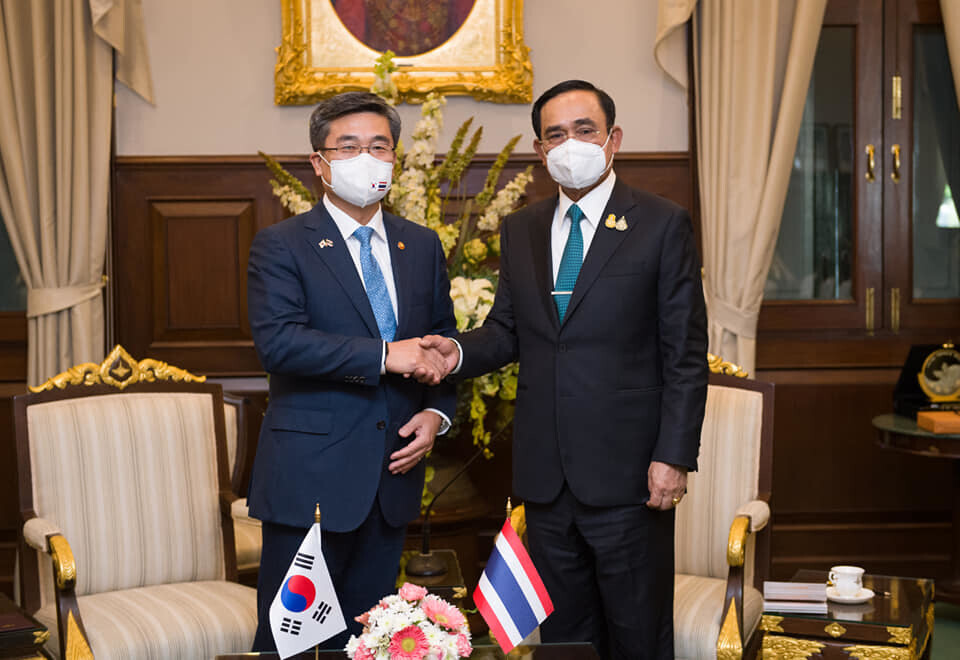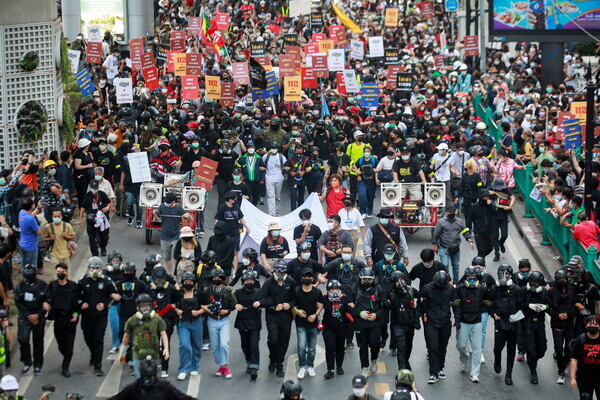hankyoreh
Links to other country sites 다른 나라 사이트 링크
Can S. Korea's New Southern Policy really be called a success?

On Dec. 20, South Korean Minister of National Defense Suh Wook visited Thailand, where he met with Prime Minister Prayut Chan-o-cha. According to the ministry, during that meeting, Suh “shared in-depth discussions” on regional security, bilateral national defense, and defense industry cooperation with Prayut, who serves concurrently as Thailand’s defense minister.
Suh also proposed at the meeting that the Thai government should acquire South Korean weapons. In short, he went to Thailand to make a sales pitch.
A second frigate and a Korean GPS-based guided bomb were among the items presented by South Korea’s Ministry of National Defense.
Seoul had previously sold a 3,650-ton frigate to the Thai navy three years earlier in December 2018. At the equivalent of 520 billion won (US$437 million), that frigate represented the biggest single defense contract in Thailand’s history.
Last year, South Korea sold around 6 trillion won (US$5 billion) worth of domestically produced weapons to other countries. It sold FA-50 trainer aircraft to Thailand and Indonesia and T-50s to the Philippines and Indonesia.
With the countries of Southeast Asia turning into the biggest customers for South Korea’s defense industry, military authorities predicted in late December that the value of weapon exports would surpass the value of weapon imports for the first time this year. The South Korean government is touting this as a success for its New Southern Policy.
Korean tear gas in Thai protesters’ eyesThe New Southern Policy was first presented by President Moon Jae-in during a visit to India in November 2017. Its focus is on India and the 10 members of the Association of Southeast Asian Nations, or ASEAN.
In August 2018, the Blue House created the Presidential Committee on New Southern Policy under the Presidential Commission on Policy Planning. Three months later, it formulated an “implementation strategy” for the policy.
As key objectives, it named the “three Ps” of “people,” “prosperity,” and “peace.” The inclusion of “people” as one of the keywords appears to be based on the emphasis ASEAN places on “people” in its Charter, and the Moon administration’s own history of adopting “people first” as a slogan.
The problem is the reality of things. Adhering to a principle of putting “people first” necessarily means that you cannot overlook the practical conditions of human rights and democracy in a given society.
For instance, Seoul has not so much as voiced “concerns” when President Rodrigo Duterte of the Philippines has had poor people and civic activists killed indiscriminately in the name of a “war on crime.” It hasn’t said a word either about the massacre of Rohingya people by Myanmar’s military ongoing since October 2016.
It also has not taken any practical steps on POSCO International, which has been involved in a natural gas extraction effort based on a tight-knit relationship with the same Myanmar military that has trampled democracy and massacred untold numbers of citizens in the wake of a February 2021 coup. The administration and ruling Democratic Party have offered a few words of diplomatic rhetoric — but they’ve just been words, and POSCO International has continued extracting natural gas off the coast of Myanmar all the while. It’s even considering drilling into another gas field.
A lot of the profits from this project have gone to the Myanmar Oil and Gas Enterprise (MOGE), which is controlled by the military. According to Myanmar’s Ministry of Planning and Finance, the MOGE is expected to record profits equivalent to 1.78 trillion won (US$1.4 billion) for the 2021–22 accounting year. There’s no way of knowing how much of that money will be used to purchase weapons for the military and police to slaughter civilians.
Let’s turn our attention back to Dec. 20, when Suh was hard at work on his pitch.
That same day, the Bangkok South Criminal Court sentenced a young person on charges of contempt of court. Two months earlier, the person in question had hacked into their own arm in court to protest its repeated refusals of bail requests for democracy activists who are currently imprisoned.
It’s painful even to imagine, but these are the sorts of things happening right now in Thailand.

In the fall of 2020, the streets of Bangkok were swarmed with protesters demanding that the military junta step down and the monarchy be reformed. Such protests erupted once again the following year.
After the military emerged “victorious” in a fraudulent 2019 election, the Thai public has refused to recognize the victory. The military has disbanded prominent opposition parties and imprisoned activists, but the protests continue.
When the protests reignited four months ago, Prayut responded with harsh suppression. Police brandished tear gas and clubs; fifteen-year-old Warit Somnoi was killed. To make matters even worse, the tear gas canister that caused his death was a South Korean export.
On Nov. 10 of last year, the Thai Constitutional Court ruled that the demands for monarchy reforms spearheaded by young activists were an attempt to “subvert the monarchy.” The court decreed that all such activities must be halted.
In a case filed by a royalist attorney, the court ruled that content on monarchy reforms included in a declaration by three student demonstration leaders in August 2020 was in violation of the constitution, as it appeared to be intended to topple the monarchy.
Civil disobedience has continued. On Nov. 14, Bangkok residents held another round of demonstrations calling for monarchy reforms. Holding three fingers up in protest, the demonstrators insisted that the Constitutional Court was “taking authority away from the people.”
Attempts by police to disperse the demonstrators led to clashes, and one person was taken to the emergency room after being struck by a rubber bullet fired by the police.
On Nov. 20, a flash mob demonstration was held in front of the Bangkok Art and Culture Centre to demand the release of prisoners including student activist Panusaya Sithijirawattanakul, who is being tried for lese majeste, or insulting the ruling monarchy.
The pro-democracy demonstrations in Thailand appear likely to continue into 2022. According to the group Thai Lawyers for Human Rights (TLHR), at least 25 people have been indicted on charges related to political expression, while six others have been indicted for lese majeste.
Humanitarian foreign policy without human rights?There is no “people” in the New Southern Policy’s “three Ps.”
At a South Korea-ASEAN summit on Oct. 26 of last year, President Moon Jae-in praised its “successful establishment thanks to the active support and cooperation of the countries of ASEAN.” On Dec. 8, an international seminar was held in which the Presidential Committee on New Southern Policy and the National Research Council for Economics, Humanities and Social Sciences (NRC) looked back on the policy’s achievements over the past four years and discussed what its future held.
During that seminar, NRC Chairperson Jung Hae-gu described the New Southern Policy as “significant in the way it overcomes the limitations of past foreign policies, which had been focused on an economic perspective, to present a humanistic vision for creating a ‘people-centered community of peace and prosperity.’”
What exactly does Seoul view as “humanistic”? If these are not “people” — the university students arrested on lese majeste charges for yearning for democracy, the teenager mangling their own arm, the Rohingya civilians who are being massacred, the members of the public battling a coup d’etat — then what are they?
Can the New Southern policy really be called a success?
By Hong Myung-kyo, staff reporter
Please direct questions or comments to [english@hani.co.kr]

Editorial・opinion
![[Column] Park Geun-hye déjà vu in Yoon Suk-yeol [Column] Park Geun-hye déjà vu in Yoon Suk-yeol](https://flexible.img.hani.co.kr/flexible/normal/500/300/imgdb/original/2024/0424/651713945113788.jpg) [Column] Park Geun-hye déjà vu in Yoon Suk-yeol
[Column] Park Geun-hye déjà vu in Yoon Suk-yeol![[Editorial] New weight of N. Korea’s nuclear threats makes dialogue all the more urgent [Editorial] New weight of N. Korea’s nuclear threats makes dialogue all the more urgent](https://flexible.img.hani.co.kr/flexible/normal/500/300/imgdb/original/2024/0424/7317139454662664.jpg) [Editorial] New weight of N. Korea’s nuclear threats makes dialogue all the more urgent
[Editorial] New weight of N. Korea’s nuclear threats makes dialogue all the more urgent- [Guest essay] The real reason Korea’s new right wants to dub Rhee a founding father
- [Column] ‘Choson’: Is it time we start referring to N. Korea in its own terms?
- [Editorial] Japan’s rewriting of history with Korea has gone too far
- [Column] The president’s questionable capacity for dialogue
- [Column] Are chaebol firms just pizza pies for families to divvy up as they please?
- [Column] Has Korea, too, crossed the Rubicon on China?
- [Correspondent’s column] In Japan’s alliance with US, echoes of its past alliances with UK
- [Editorial] Does Yoon think the Korean public is wrong?
Most viewed articles
- 1‘We must say no’: Seoul defense chief on Korean, USFK involvement in hypothetical Taiwan crisis
- 2N. Korean delegation’s trip to Iran shows how Pyongyang is leveraging ties with Moscow
- 3‘Weddingflation’ breaks the bank for Korean couples-to-be
- 4[Column] Park Geun-hye déjà vu in Yoon Suk-yeol
- 5Korea sees more deaths than births for 52nd consecutive month in February
- 6[Guest essay] The real reason Korea’s new right wants to dub Rhee a founding father
- 7[Column] The clock is ticking for Korea’s first lady
- 8[Column] Has Korea, too, crossed the Rubicon on China?
- 9Why Korea shouldn’t welcome Japan’s newly beefed up defense cooperation with US
- 10Will NewJeans end up collateral damage in internal feud at K-pop juggernaut Hybe?